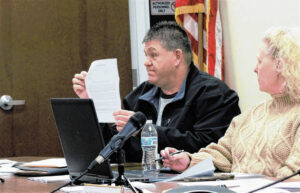A solution to Trafalgar’s zoning troubles is in the works.
Town officials are also combating claims that they want to evict people found with zoning violations.
The Trafalgar Planning Commission last week decided to move forward in the process to establish a new zoning classification for the town, either in the form of a mixed-use zoning or a planned unit development option.
This move is in response to Trafalgar’s history of turning a blind eye to residents living in commercially zoned properties, without a proper rezone. These issues boiled over starting in November when the town council issued two zoning violation letters to fellow council member, Jeff Eisenmenger.
Issues with the letters
Eisenmenger was first issued a letter in response to claims alleging someone lived at his business, Small Town Pizza and Sub Co. at 106 W. Pearl St. Eisenmenger denied those allegations, and the town’s board of zoning appeals later determined he was not in violation, citing a lack of evidence to prove someone was living in the space.
He also received a second letter for 100 W. Pearl St., which he owns on contract. He admitted that building is technically in violation because it is zoned commercial, and a woman named Betty Davis lives there. He also said he owns another property in violation, a small building behind his pizza shop that is zoned commercial, and local electrician John King is his tenant living there.
Eisenmenger, however, thinks he is being targeted because there are dozens of other properties that also have violations. He has said renting commercial buildings as residences “only became an issue” when other town council members found out he was doing it. He believes the zoning violation moves are a political tactic to get him out of office.
Eisenmenger is the only person who has received violation letters and could be the only person for now as the town pursues changing its zoning code.
Throughout this dispute, Eisemenger also has accused the town council members of wanting to evict people from their homes, which he said many times he is not in the business of doing.
“Miss Betty Davis, she’s 90 years old. She’s lived here all these years, and now we’re against her? I’m not,” Eisenmenger said on Jan. 9.
The initial zoning violation letters sent out to the two properties did include a line requiring anyone living in those buildings to vacate within 10 days. In a letter sent to the Daily Journal, the deeded owners of 100 W. Pearl Street, where 92-year-old Davis lives, called the town “scrooges” for wanting to evict her.
The owners, Ron and Joyce Haughey, live in Florida and Eisenmenger runs the building on contract for them, though they did not mention that in their letter. They said the zoning violation timeline laid out in the letter sent to them would have required them to evict Davis on Thanksgiving, which they said they would not do. They also said they did not receive the letter in Florida until six days after it was sent, which left four days for them to address the violation.
“Who Scrooged the Trafalgar Town Council demanding eviction of an elderly lady by Thanksgiving Day?” the Haugheys’ letter read.
Ultimately, Davis was not evicted from the building, and the 10-day notice is not being enforced by the town.
Jason Ramey, one Trafalgar Town Council member involved in addressing zoning violations, said he and the other council members did not know the 10-day notice to vacate was included on the violation letters the town sent.
What likely happened is the town attorney drafted a general violation letter, similar to ones used in other municipalities, and that was sent, he said.
After it was brought to his attention, he and council president Jessica Jones, told the town attorney and building commissioner they did not want the letters to request people vacate.
Ramey has said he does not want to displace people. He wants to see them follow the rules by rezoning their properties.
“That was 100% an oversight,” Ramey said. “A lot of what we’re trying to get accomplished and get regulated properly is new to us. So, there’s going to be mistakes.”
A solution in progress
Eisenmenger attended the planning commission’s Jan. 9 meeting to provide input on discussions about adopting mixed-use zoning. He initially suggested it after he received the two zoning violation letters.

Jacob Bowman, the town attorney and newly-appointed planning and zoning attorney, explained the town has a couple of options for a new zoning classification, either a mixed-use, a PUD or a combination of both.
Mixed-use zoning generally allows for a mix of uses to be combined on a property, such as buildings in old town districts with businesses on the first floor, and a residence on the second floor. A PUD allows more flexibility, and generally are not subject to already established zoning standards. A property zoned PUD, for example, could have a mix of different types of houses and also commercial spaces.
A sticking point among the plan commission was how to handle those already in violation. One option could be for the town to adopt mixed-use zoning, and then flag each of the properties that need to apply for a rezone. The problem is, there are dozens of zoning violations, Bowman said.
Another option could be to grandfather in all other properties currently in violation, and then move forward with allowing mixed-use zoning for new projects brought to the town. Commission members, along with Eisenmenger, agreed that may be the easiest solution.
“It’s very hard because zoning has never been looked at. It’s never been monitored, so it’s hard to catch up,” Eisenmenger said.
Mary Wilkerson, a planning commission member, questioned if the issues with zoning are disrupting the town, and questioned if the town needed to act on these violations at all.
“I mean, a lot of people are doing it, and evidently their neighbors don’t care,” Wilkerson said.
Bowman said that could be taken into consideration. He added he had concerns about people not following a new zoning ordinance anyway, since the town has given little oversight to zoning in the past. Drafting a new comprehensive zoning classification takes time, and money.
“If we create a process, the procedures, the ordinances, put all this in place, and then no one enforces anything. What did we really do? We did nothing,” Bowman said. “That’s a big hesitation I have when changing these things from a dollar and cents aspect.”
Trafalgar lacks a full-time planning director or town manager to oversee operations and planning in the town. The building inspector works on a case-by-case basis while also working another full-time job, and town council members also have jobs outside of their council duties. The one full-time employee the town does have holds essentially three jobs as the water, wastewater and street superintendent.
The town planning commission has also been without a lot of guidance over the years, with no rules and procedures previously in place for handling business that comes before them. The town fired the previous planning and zoning attorney late last year, before hiring Bowman’s firm, Williams, Barrett and Wilkowski to take over and provide structure to the board.
This current commission has also never gone through the process of rezoning a property, and has typically in the past just granted zoning variances. Members of planning commission during the Jan. 9 meeting continued to mix up the difference between a variance — which is an exception applied to an existing town zoning code upon request from an individual — and a zoning classification itself.
Ramey, who was not at the planning commission meeting, said the general lack of oversight in Trafalgar has resulted in not only the zoning issues in town but also problems with subdivision developments and drainage issues.
“This town has traditionally done a very poor job of adhering to policy, and following through with issues,” Ramey said. “I’ve been on the council for some years, I’ve tried to keep up as we go. But we are not good at it. And we’ve got to get better.”
This problem has come more to light as the town continues to grow, he said. Ramey and other council members, including Eisenmenger, have pushed for the town to consider hiring a town manager, but budget constraints prevent that from happening anytime soon.
Ramey agrees the town needs mixed-use zoning, but with proper requirements to ensure the buildings are up to code and appropriate to live in, he said. He does not agree with grandfathering existing violators in though.
Drafting a new zoning classification is expected to happen over the course of several planning commission meetings, and a new ordinance will eventually make its way to the town council for approval.
Discussions on the mixed-use zoning options are set to continue at the planning commission’s next meeting in February.





